June 6, 2025 | 08:31 GMT +7
June 6, 2025 | 08:31 GMT +7
Hotline: 0913.378.918
June 6, 2025 | 08:31 GMT +7
Hotline: 0913.378.918
Editorial board’s words: The soil is rapidly degraded due to the over-exploitation of land and plant cultivation, overuse of growth stimulus ingredients, and inorganic fertilizer to boost productivity. Protecting soil health, water resources, plant health is protecting human health and the environment and is a hot topic from now on.
It is also Vietnam Agriculture Newspapers’ desire to open a subject specializing in Responsible Agriculture, which welcomed the join of several scientists, managers, localities, cooperatives, and businesses among others unanimously aiming for a responsible production starting from each citizen.
Accounting for cultivation units, Hanoi is considered one of the leading regions in limited use of crop protection agents with several districts accounting for just one part seven to one part ten in an average of the total units nationwide.
“After spraying pesticides, I felt my head as hot as being hit by boiling steam every night, I heard the bang sounds regularly and my shoulder were onerous as burdening dozen-kilogram machine. I could not eat and sleep, my body was bruised. Despite changing clothes and taking shower but I still smelt the pesticide around somewhere. I was too frightened to leave the job after just one crop.”
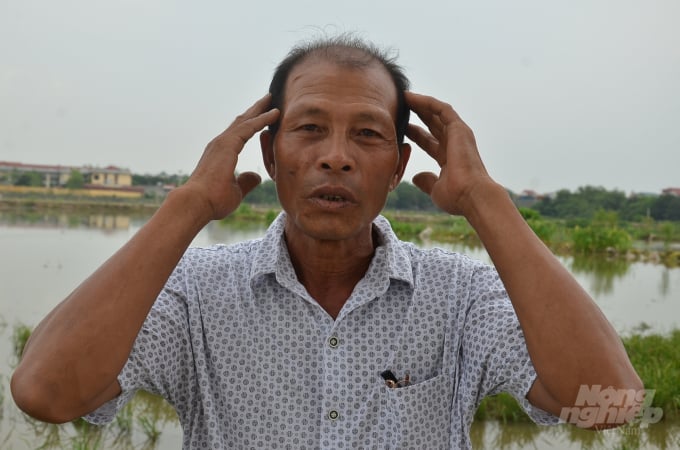
Nguyen Van Ta, Leader of the Production team in Ha village, (Chuyen My commune, Phu Xuyen district, Hanoi) said after spraying pesticides, his head felt as hot as being hit by boiling steam every night, he heard the bang sounds regularly and his shoulder was onerous. Photo: Duong Dinh Tuong.
It is the story told by Nguyen Van Ta, Leader of the Production team in Ha village, (Chuyen My commune, Phu Xuyen district, Hanoi. He reminded the spring crop in 2021 following a land consolidation, he bought a pesticide spray machine for some hundreds of dong for service work that earned him millions of dong, and dozens more in just one crop. However, he chose to give up.
“The village is home to 253 households, with a few using crop protection agent since 2017 but we never have a poor crop,” Ta said.
Nguyen Van Tuyen, Director of Chuyen My commune Cooperative said that his 260-ha rice plant area can yield over 2 quintals/rod for a winter-spring crop and 7-1.8 quintals/rod in the season crop almost without the support of pesticides.
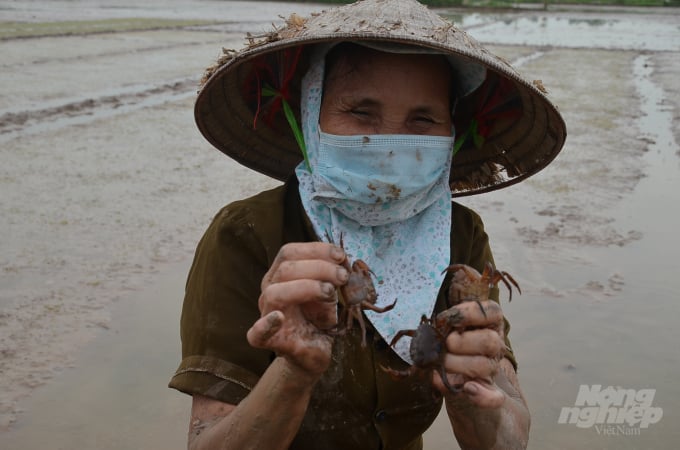
Nguyen Thi Xuan shows off her newly caught crabs. Photo: Duong Dinh Tuong.
He elaborated that the cooperative had been a pesticides supplier but it stopped the work for nearly 20 years and has seen no stores selling pesticides since 10 years ago. Currently, about 95% of the people in the commune do not use pesticides, the number of households with aerosol cans is counted on the fingers.
"The more pesticides we spray, the more pests there are, in case it shows less effective, we need to increase the dose. We had sprayed very few pesticides previously, so we found it was not hard to acquire success when moving from integrated pest management, (IPM) to System of Rice Intensification (SRI), then progressing to no longer use of pesticides,” said Tuyen.
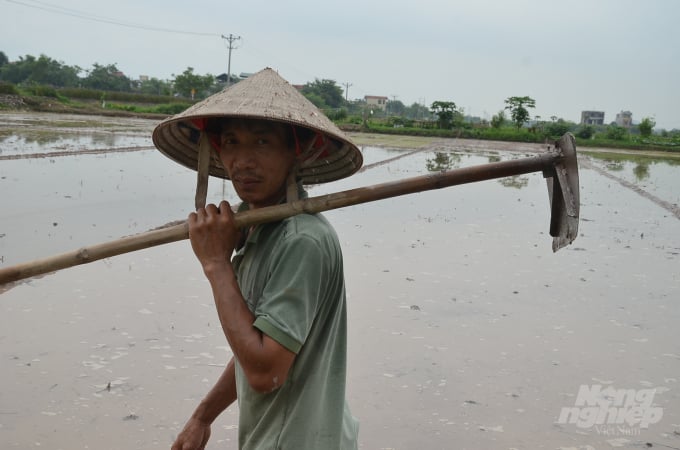
A farmer in Chuyen My commune (Phu Xuyen, Hanoi) is preparing for the 2021 crop. Photo: Duong Dinh Tuong.
As mentioned by Tuyen, when the rice blast disease breaks out the spring crop, the cooperative recommends that people go to remove the leaves, and encountering aphids by half a liter of mazut oil mixed with a basket of sand.
In tackling mice, the cooperative established a group of eight people, based on their growth and development period of rice to select appropriate biological drugs. With grass in a difficult case, it is estimated that 30-40% of the people still use pesticides to handle. With the golden apple snail, 80 80% of farmers catch them by hand, and 20% of others using pesticides to kill the exotic pest.
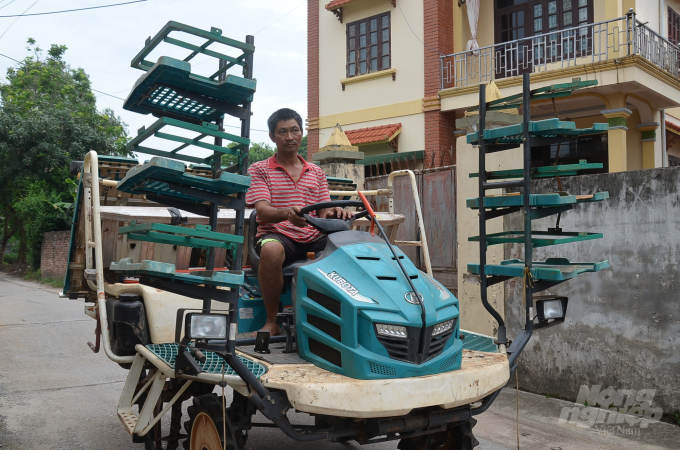
Nam Trieu commune has 45 planting machines. Photo: Duong Dinh Tuong.
I travel far and double-quick with Nguyen Dinh Luc and his herd of 2,000 ducks – a warlike army that willing to “exterminate” every single golden snail, pests and bugs helping limit the use of pesticides and reduce the amount of bran used.
As similar to Chuyen My, Nam Trieu commune in Phu Xuyen district also casts a little shadow of pesticides as the pests are all below the threshold. The secret here is to use strong resistant varieties, mechanical equipment to transplant the rice (with 45 units), and balanced fertilization according to IPM and SRI techniques.
In addition, the ventilation in ricefield is the reason for the reduction of about 70% of pests and diseases, reducing maximum the use of pesticide, but the yield is still better than conventional farming by 5-10%.
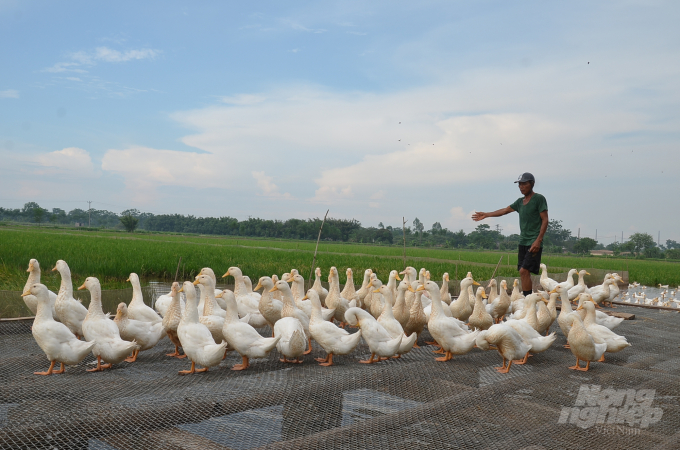
The model of rice-fish-duck by Phan Cong Hai (Nam Trieu commune, Phu Xuyen, Hanoi). Photo: Duong Dinh Tuong.
Changing the cultivation practice of a household is a tough grind, not to mention a village or a commune. When the classes teaching IPM and SRI were launched, the organizers must lend fields for experiments and picked three or four farmers from each hamlet to train. From thick sowing to sparse sowing, from hybrid fertilizing to period fertilizing, from leaving the inundated field to drying it for 15-20 days when the rice plant produces limbs, all are so unfamiliar to the farmers.
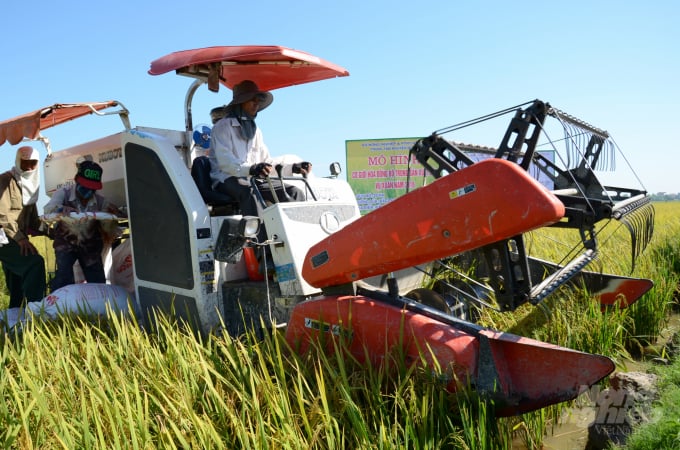
Harvesting rice in the suburbs of Hanoi. Photo: Duong Dinh Tuong.
The farmers in the IPM class criticized: “You guys just got home from school, and we've been farming for the whole life, why we have to listen to you? Some people even saw that the experimental field was too sparse and surreptitiously sowing more plants in the field...
To pursue the farmers, the cooperative chairman board and staff of plant protection had to directly pull up the seedlings, sowing, and fertilize in a hands-on manner. Surprisingly, although the plants were sparsely sowing, the yield was higher than that of the thick one, and the plants were healthy without the use of pesticides.
Luong Van Hoan, head of the Plant Protection Plantation Station of Phu Xuyen said that the district has 27 communes and towns with 6,800 hectares of rice cultivation and more than 300 hectares of vegetable cultivation. For many years, no pesticides have been used.
Pests nearly disappear thanks to the adoption of IPM and SRI techniques including sparse sowing and well-proportioned fertilization. The yield of the previous spring crop was 2.3 quintals/rod and that of 2020 was 1.8 quintals per rod.
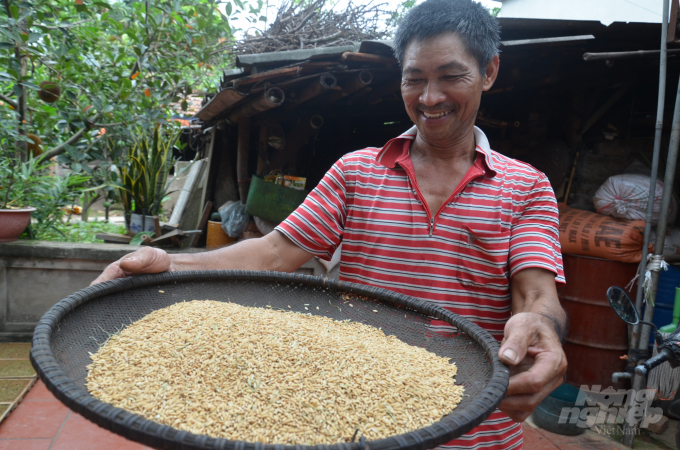
Joyful with clean grain. Photo: Duong Dinh Tuong.
For clear demonstration, Hoan gave me a list of sales statistics of more than 80 agricultural material dealers in the district. Quite a few of them in the category of zero or only a few kilograms of pesticides.
In 2020, the total number of pesticides sold in the spring crop of the whole district was only 1.9 tons, 1.5 tons in the winter crop, 422 kg in the winter crop; In 2021, the total number of pesticides sold in the spring crop was 1.2 tons. The average amount of pesticides used in the whole district in 2020 was only 0.26 kilograms per ha per year.
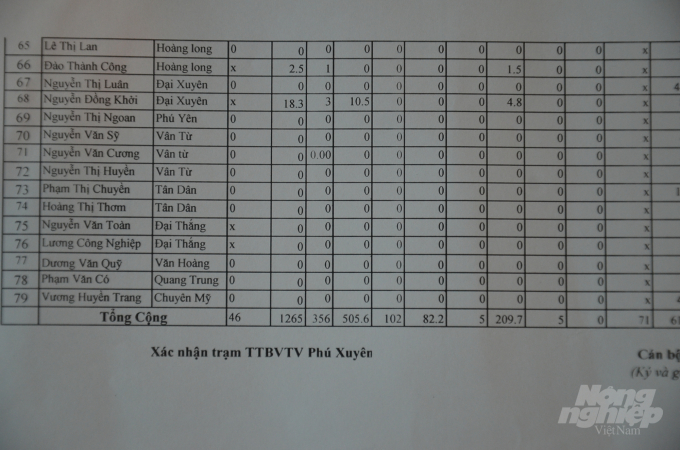
List of pesticide sales of over 80 agricultural dealers in the district. Documentary photo: Duong Dinh Tuong.
“In the past, businesses in the field of crop protection agent used to hold dozens of seminars annually to promote their products, distribute money and present gift for farmers but they have not returned four to five years since as the pesticides are unmarketable anymore.
Since 2012, Hanoi has required plant protection and cultivation officers to work with each commune. They take responsibility for staffing the local authorities on agricultural production such as which varieties to choose, how to plant a seedling, sowing and fertilizing, how to investigate pests, and how to handle pests in each household.
It is frankly to say that farmers will not use pesticides anymore despite the occurrence of pests, but insist on planting clean rice,” Luong Van Hoan Head of the Plant Protection Plantation Station of Phu Xuyen said.
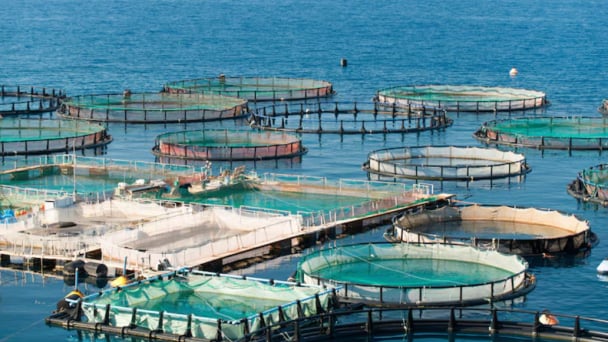
(VAN) Technology is redrawing the map of Vietnamese aquaculture: more modern, greener, and more sustainable.

(VAN) Novel process harnesses machine learning to reveal groups of genes that determine how efficiently plants use nitrogen.

(VAN) Several scientists and farmers are experimenting with soil treatment in some key durian-growing regions such as Cai Lay (Tien Giang), Dak Song, Gia Nghia, and Dak R’lap (Dak Nong).
/2025/05/25/4127-3-073637_820.jpg)
(VAN) Thanks to the promotion from an FAO-implemented project, vegetable production in greenhouses in Moc Chau has seen strong development, from 1.5 hectares in 2021 to nearly 50 hectares in 2024.

(VAN) FAO has recently supported USD 140,000 to implement the project 'Risk mitigation human-animal interface risks through disease control initiatives in pig farming.'

(VAN) The People's Committee of Tra Vinh province has approved an adjustment to the investment policy for the Green Hydrogen Plant project, increasing its area to approximately 52.76 hectares.
![Reducing emissions from rice fields: [2] Farmers’ commitment to the soil](https://t.ex-cdn.com/nongnghiepmoitruong.vn/608w/files/news/2025/05/05/dsc08881jpg-nongnghiep-140632.jpg)
(VAN) Clean rice cultivation model in Thuong Tan commune, Bac Tan Uyen district, is assisting local residents in achieving sustainable agriculture by substantially reducing costs, increasing productivity, and protecting the environment.